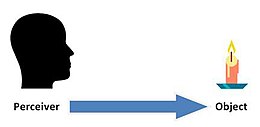Our website is made possible by displaying online advertisements to our visitors.
Please consider supporting us by disabling your ad blocker.
Direct and indirect realism

In the philosophy of perception and philosophy of mind, direct or naïve realism, as opposed to indirect or representational realism, are differing models that describe the nature of conscious experiences;[1][2] out of the metaphysical question of whether the world we see around us is the real world itself or merely an internal perceptual copy of that world generated by our conscious experience.
Indirect realism is broadly equivalent to the scientific view of perception that subjects do not experience the external world as it really is, but perceive it through the lens of a conceptual framework.[3] Furthermore, indirect realism is a core tenet of the cognitivism paradigm in psychology and cognitive science. While there is superficial overlap, the indirect model is unlike the standpoint of idealism, which holds that only ideas are real, but there are no mind-independent objects.[4]
Conversely, direct realism postulates that conscious subjects view the world directly, treating concepts as a 1:1 correspondence. Furthermore, the framework rejects the premise that knowledge arrives via a representational medium, as well as the notion that concepts are interpretations of sensory input derived from a real external world.
- ^ Lehar, Steve. (2000). The Function of Conscious Experience: An Analogical Paradigm of Perception and Behavior Archived 2019-06-03 at the Wayback Machine, Consciousness and Cognition.
- ^ Lehar, Steve. (2000). Naïve Realism in Contemporary Philosophy Archived 2012-08-11 at the Wayback Machine, The Function of Conscious Experience.
- ^ Schacter, Daniel (2011). Psychology. Worth Publishers. ISBN 9781429237192.
- ^ "Epistemological Problems of Perception - 2.2 Idealism and Phenomenalism". Stanford Encyclopedia of Philosophy. Dec 5, 2016. Archived from the original on Apr 26, 2022. Retrieved Apr 27, 2022.
Previous Page Next Page
الواقعية المباشرة وغير المباشرة Arabic ڕیالیزمی ڕاستەوخۆ و ناڕاستەوخۆ CKB Realismo directo Spanish Kaudne realism ET واقعگرایی مستقیم و غیرمستقیم FA Representationalismi Finnish Réalismes direct et indirect French Realismo direto e indireto Portuguese สัจนิยมโดยตรงและสัจนิยมโดยอ้อม Thai Doğrudan ve dolaylı gerçekçilik Turkish


